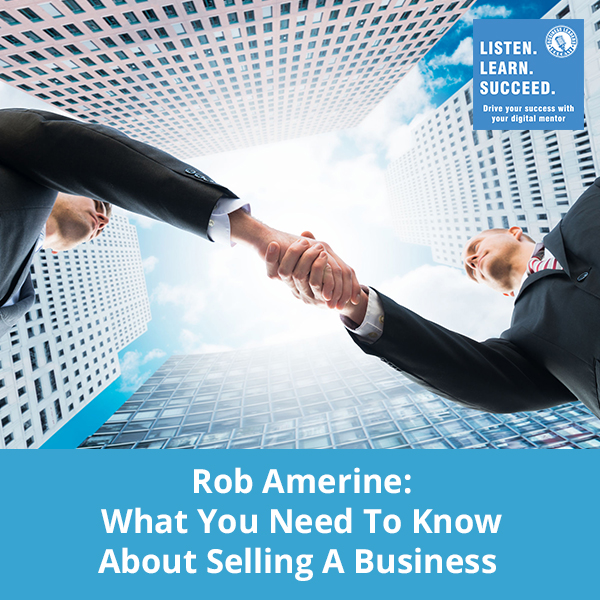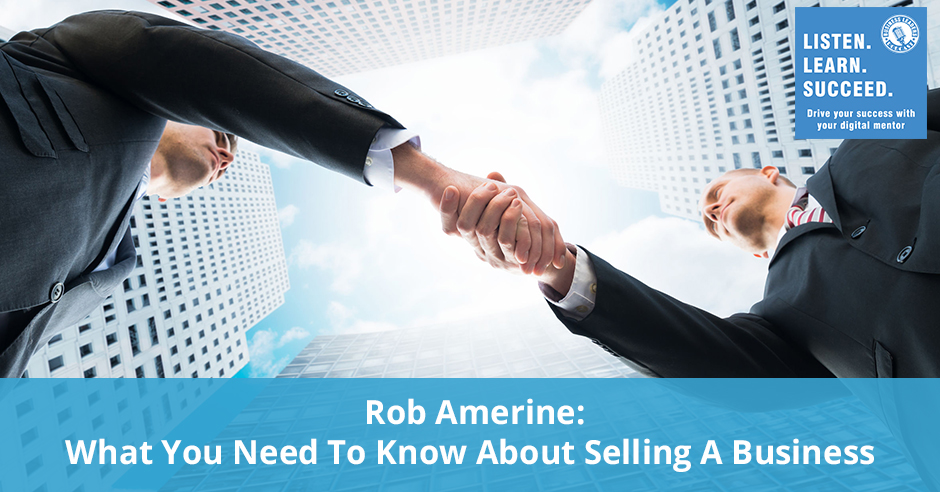Rob Amerine: What You Need To Know About Selling A Business


With everyone either selling or buying, you would think it’s a simple process for them to meet and finish the job. However, many business owners and buyers alike still have a hard time looking for the right business or buyers for them. Rob Amerine, certified business intermediary of The FBB Group, Ltd, talks about selling a business and helping buyers see what they want and need. He shares some nuggets about how to have good businesses that are ready to sell as well as the things you need to have a higher sales price. Rob walks through the process and discusses the small business development council (SBDC), the market, some expectations and misconceptions, and more as he advises businesses to build to sell.
Rob Amerine: What You Need To Know About Selling A Business
We’re very fortunate to have Rob Amerine. He is a Certified Business Intermediary with the FBB Group in Colorado Springs. If you would, tell us a little bit about your business and who you serve.
Our firm was originally started in 1982 called the FBB, First Business Brokers, and then we changed the name to the FBB Group. We wanted to become a little bit more nuanced, people have a lot of questions about confidentiality so we want to make it more straightforward. We actually added the ability to do stock transactions at that time as well. Our Founder, Ron Chernak, had his FINRA license. There was a little branding and name change at that point to the FBB Group.
What is it that you guys do?
If you don’t live in this world, you don’t realize that a lot of small businesses transact through intermediaries like ours where a seller needs to sell and we have buyers that come to our firm. It’s a very niche industry, but it’s very important to the economy, being able to find buyers for sellers that are looking to transition their business. It’s one of those businesses where you don’t realize it touches a lot of different facets of the business from the legal side, to the accounting side, to the marketing and the operations. You can imagine all the different things that we touch and see. It’s vital to what sellers need. Rarely do businesses sell without someone like us. If it does happen, it’s some of the bigger businesses. Small business is the engine of the economy, and selling businesses is where this value changes over.
Looking back over the past few years, would you say that there’s a fair quantity of businesses available to be sold? Is there a shortage?
There are a lot coming on the market, more so than we’ve seen before since the recession. We’re going through that cycle. No one knows when it’s going to end. There’s a lot of them out there. There are also a lot of businesses that are not ready to sell that out there. They’re trying to sell and they’re very frustrated. About one in ten go to the market actually sell. When you use a firm like ours, that can increase to maybe three or four out of ten. You increase your percentages by having a firm like ours involved.
It’s better to know than to wait.
You’ve got the business owner reading this and he goes, “I know what my company’s worth.” When you find the nine out of ten businesses that don’t sell, what are the typical reasons you run across as to why they don’t?
Unrealistic expectations. Most of the time, business owners have gotten their valuation from their accountant. The accountant does a great job of doing accounting, but they’re not selling businesses. Usually, when they value business, they may not have the latest information. Some accountants do a great job, others don’t. The question is, does your accountant value your business at the market rate that is today and not off something maybe they heard or something in the past that they’ve held to? Accountants don’t sell businesses, we do. We work with a lot of accountants. We like accountants. They have a very important role in this process, but we always say, “Let’s check your numbers with your accountant and see what it’s worth.” If it’s off, wouldn’t you want to know that instead of waiting until it’s time to sell?
I think about some of the information that’s available to the business owner. The business owners are typically in the business, not on the business. When you’re out there in the marketplace, where do your typical buyers come from?
Buyers are dime a dozen. Buyers are out there. There are estimates of over $1 trillion in cash on the sidelines waiting to invest in small businesses, all the way up from private equity groups down to individual buyers. There’s a lot of cash out there. We always say that buyers will come, but you need good businesses that are ready to sell. There are businesses that are good but they’re not ready to sell yet, especially for the price may be the owner wants for it or they need to be tweaked a little bit. There are some things we can help them do to get them ready to sell and that may take two to three years to do. If they go out now on their own, they may be leaving money on the table.
When you walk through the door and the business owner says, “I’m in the mode.” If you’re not immediately in the mode to sell, what are the things that you would recommend to a business owner that might help them achieve a higher sales price?
 Selling A Business: Buyers are number-driven.
Selling A Business: Buyers are number-driven.
Buyers are numbers-driven more and more. You’ve got buyers coming out of Ivy League schools that have the numbers figured out. They’ve got the multiples figured out. The numbers help drive the conversation. Whereas before, if you had a good business that maybe was attractive, the numbers didn’t have to jive. They would get in and maybe look at the numbers later. Now, the buyers are looking at the numbers because there are so many out there. The numbers have to match even for them to even inquire on the business. It’s important that the numbers match up to what the buyers are looking for. We help do that. Of course, we have to start with the financials.
We start with tax returns. Tax returns tell a lot about the business. Profit and loss can basically show one thing or another, but the tax returns are where the foundational part of that cash flow starts and where the banks and the lenders start as well. We start there and build on top of that and use the profit and loss and balance sheets to help supplement and figure out what is the true cash flow of that business. We can start level setting the numbers expectations going from there. That usually drives more recommendations. What’s going on with their cost of goods sold? What’s going on with your balance sheet? Those things that buyers are trained to look at, we’re going to look at the same way and help you say, “We need to move these things around. We need to have your accountant do these things.” We make sure that you’re prepared when you’re ready to sell and that these things are ready to go and you do not have to backtrack.
What I’ve run across and have heard is that there some of the things that are obvious. EBITDA, I don’t think everybody knows what that is so if you would.
Buyers are diamond dust. They are out there.
It’s actually a term that most people know. It’s looking at their earnings before interest, tax, depreciation and amortization. That’s where you get your EBITDA from. A lot of businesses though aren’t priced on EBITDA. If it’s under $1 million of cash flow, we use a term called seller’s discretionary earnings, which includes the owner’s salary. EBITDA usually doesn’t include the owner salaries as an add back. There’s a difference there. You can back in the multiples one way or the other. You could do a multiple on SDE for a business over $1 million. SDE, that’s seller discretionary earnings. That’s a similar term to EBITDA.
I had a client that came to us, we had an SDE calculation. He was talking EBITDA multiple. We had to change our approach on the financials to say, “Let’s talk EBITDA,” because we want to talk their language versus SDE, which is more of those businesses that are under $1 million in cash flow. Multiples are out there. It depends on what term you’re using. You got to be careful that you could be talking about the wrong term and the wrong multiple which can be confusing.
For a lot of the business owners, there are some of the obvious things that buyers look for, revenue and whatever. What are some of the things where a business owner may have a very successful business but they don’t see that as risk, such as the concentration of customer base?
I was talking to a client and found out that one of their customers is 80% of their revenue. What do you do with that? How do you determine a multiple? It’s a very profitable business, but the question for him is when does he want to sell. The question now is, “Do I try to drive up revenue and get more clients to push that percentage down, or do I try to basically see if I can find another way to maybe split up that contract and not make it such a high risk for a potential buyer?” Those things do factor in. Your multiple would go down if your customer concentration is high. Anything over 15% or 20%, buyers are going to go, “This is significant.” If you can keep it at 15%, you’re pretty safe.
From my experience, many business owners don’t know the broad range of selling options. They’re typically going, “I’m going to cash out. I’m going to go fish or golfing.” When you’re looking across your experience, how frequent is an all-cash deal?
We pride ourselves of getting all cash for our clients. The last two deals I’ve done have been all cash, which has been great because seller carry, with the new SBA rules that came out, the buyer equity required dropped from 25% down to 10%. A lot of banks are going still higher than that maybe 15% or so. That made up the difference of what we were seeing, some of that 10 % to 15% seller carry that will come with SBA loans. That’s pretty much gone away. We haven’t done a deal recently that has gone through SBA or even through private financing where a seller carry was a big part of it. The SBA has made those changes to help bring that into their financing into the seller. That gives the sellers a little bit more money in their pocket upfront versus having a two to three year standby where they have to wait a couple of years to start getting paid on their seller carry. It’s working out pretty well.
I think about the nature of our discussions so far. I think about the business owner that’s going, “I’ll just sell next week.” What’s the proper time for a business owner to start working with you if they’re thinking about selling?
That question comes up quite a bit. People don’t realize that even a year or two out can be too late. Three to five years is what we’d like to see because that gives you enough time to get the business to where you want it to be. You have enough runway there to make the changes. We know that’s the ideal scenario and things don’t happen that way. Events happen and life happens. We’d like to see that. We can do some retroactive work sometimes with your accountant and move things around a little bit to help you get the business ready to sell.
 Selling A Business: It’s not only about getting to the finish line. It’s also about what happens after the finish line.
Selling A Business: It’s not only about getting to the finish line. It’s also about what happens after the finish line.
What we’re trying to prevent here, which is why I volunteer with the SBDC and other organizations, to get in front of that. SBDC is Small Business Development Council. Small business drives the economy. They’re a government arm of SBA. There are a bunch of volunteers there that are trying to help these businesses before it’s too late and things are already in a place so it’s hard to change where they’re at. Getting out in front doing education, webinars and seminars, we do quite a bit those and just try to get out in front of people. We’ll get the calls when they’re ready to sell, but sometimes we would rather have talked to them earlier so we could help them out better.
Typically, when the business owner reaches out to you, what’s the reason that they want to sell?
In this Baby Boomer generation, there’s a lot of burnout. Burnout happens at any age. It’s when the business owner has gotten the business to where they want to get it. I closed on a business where they had gotten the revenue to $1 million and they were doing great cashflow off of that. You could tell they were done. They’re in their mid-40s. They’re not in retirement age, they’re just ready to move on and they felt it. I agreed with them. You’ve got the business where it needs to go. Now someone else needs to come on and take it over and go to the next level.
If I was to talk to the past business owners that have engaged you to help them out, what do you think they would say is your chief value-add to the process?
It depends on how the transaction goes and what they have to do with the transition. The transition is that critical point where you close on the deal. Everybody is looking forward to getting a new owner. The other owners are maybe retiring, moving on. Now you’ve got employers, now you’ve got the transition piece. There’s a lot of stuff that can go in to it. It’s us not only getting to that finish line, which is the important part, but also what happens after the finish line and what happens to that business? We know if that business doesn’t do well and because someone could write a check for it and buy it, if that business isn’t set up to do well, that’s not going to help anybody.
Buyers will come but you need good businesses that are ready to sell.
You’ve got a legacy of those people that are selling and the fact that their employees are being taken care of. A couple of years later they can say, “That was a great deal. Your business is still going well.” That drives the economy as well. We don’t want to set up businesses to fail. We do everything we can to help that transition. Of course, we make clients out of buyers. They come to buy and that’s something that’s been happening here in this firm. I’ve seen it firsthand where buyers of ours, years ago, then become sellers because they knew how important the process was and our involvement in it.
In a worst-case scenario, that’s where you have that quantity of businesses that come to market and don’t sell. If you’re that business owner sitting out there and they attempt to do it themselves and it doesn’t work out, what typically is the fate of that business that doesn’t sell?
There are a lot of buyers out there that come to our firms, but they also go directly to the clients. They try to get them to come off and start working. I was talking to a lady that has a great business. It will sell very well, but she got pretty involved with a possible acquirer. They milked the information out. We always say if you’re working with one buyer, they’re in the driver’s seat. If you work with multiple buyers, you’re in the driver’s seat. We try to help people understand. When you’ve got some emotion involved, you’re just done and you’ve got this person to knock on the door, you’re like, “Who else is out there?” You don’t know. You think this is the only one and you almost convince yourself that this is the best deal when the reality is it may not be. We have sellers come to us and say, “I’ve got so and so looking at the business.” So we say, “We’ll add them into the mix,” but one out of 100 actually buy that business actually come in. We’ve seen that happen over and over again. They’re not the buyer, it may be buyer number four or five that actually ends up going through the process and buying it.
That’s why you have auctions. You have multiple buyers for a single deal. In looking at a business owner and he goes, “That makes a lot of sense to me. I want to talk to you. It may be that I want to sell my business in three to five years maybe not.” How much time on a monthly basis do you think getting the business ready would entail?
Not that much. There are some obvious things. That’s the thing. It’s not about trying to say, “I’m going to give you ten things that you never thought about before.” It’s going to be eight out of ten of them you probably thought about, but there are two things that you didn’t think about. You’re going, “I didn’t even think about that way.” A good example is if they own a real estate. How’s their market rent? Sometimes they say, “I’m not paying myself rent.” “How do you think the new owner is going to look at? What is market rent?” “I don’t know.” We have to look at that and that drops the price of your business if you’re not realizing that expense. They don’t think about that way. We always like to provide people with options. If they have real estate and the business, is selling the business better and then having the real estate as good retirement revenue a good idea? Can we combine them and do both and get a good chunk of change over to you that you can then reinvest somewhere else versus being a landlord? What’s the best scenario there? How does that work together?
A lot of those come into play where we want to give them the most options and then help them tweak that along the way as they’re getting ready to sell. That’s why I said three to five years because you can make those adjustments. You can move the real estate into a separate LLC and have that setup. You may go to your accountant and say, “We’ve been saving our taxes here in these areas, but I need to start reporting this to the bottom line. There’s about $100,000 in this business that is up in this area here in expenses, but it’s not profit. The banks don’t like that. Let’s start changing that over so we show it’s profit. Pay the taxes on that and then realize that three times multiple or four times multiple on that revenue. $100,000 turns into $300,000. You just pay a couple thousand dollars in taxes over the next two years. That’s a good return on the change in your investment and how you’re reporting your numbers.
 Selling A Business: Get evaluation on your business as soon as possible by someone other than your accountant.
Selling A Business: Get evaluation on your business as soon as possible by someone other than your accountant.
If you’re the business owner and you have what is effectively a lifestyle company, you’re making a good income and you get to do what you want. You have a number of things in there, the company car, the company airplane. From the potential buyer’s perspective, how do they view those types of items in a company?
Most buyers expect it. That’s the joy of owning your own business. You can do that and you have some latitude on that. To a point you expect it but sometimes it can get a little bit too much. Then you have the lender involved and the lender says, “What’s the real cashflow here?” You start casting doubt on some of the financials. We try to shore that up and just basically say, “These are the real ones.” When you start adding your ten-person family cell phone into the mix, you’ve got friends and family involved and all those other things you go, “Can we make those adjustments and move that out? That looks a little bit better.” Cleaner financials, buyers like those. When you’ve moved those things out and you can even show it to say, “We want to go sell our business. We started thinking about this. You can see we moved these out. We started showing those as actual discretionary earnings.” So they’re separate out. When you go to the appraisal with the bank loan and everything else they say, “That’s easy to see,” versus having it all wrapped up here and it’s nebulous. What was the real detail here?
For that business owner who’s going, “I just had somebody call me on the phone. They are interested. I have an unsolicited offer for my business.” What advice would you offer to them if that happens to them?
I would say get a valuation on your business as soon as possible by someone other than your accountant, someone who sells businesses. There are appraisers out there, but those are usually used by banks. Those are going to run you $10,000, $15,000 which doesn’t make sense to spend that every time someone knocks on your door. That appraisal’s may be based on lending criteria.
The habit of burnout happens at any age.
Typically and they’ll write a 30-page report and they’re great. They show you a lot about the business, but it’s overkill for what you need. You just need a range or value of what is my business worth as that benchmark. If do that over a year or two, then you can start to see the trend a little bit more. That’s what I would recommend. Get a business valuation from a firm like ours where you’re basically able to say, “I think my business is worth this,” and then you can say if this is a good deal or not. A lot of times we’ll get approached by sellers that say, “Is this a good deal or not? If it is, can you help us negotiate?” There’s nothing wrong with that versus trying to go to the market and finding other buyers.
Maybe it is the buyer that you want to use. I have a client that’s doing that and they’re looking at a multimillion-dollar offer but they’re saying, “Can you help us negotiate with this one possible acquirer? If that doesn’t go, maybe we go to market.” There are ways to figure that out to make sure you’re represented. I put together a graphic on this idea of a business. It’s not a linear process. There are many different starts and stops and everything. It’s more of a maze. You’re going through it. The whole point in this was to say there are a lot of dead-ends in selling your business. You shouldn’t go at it alone.
If you understand good business, you understand that you need to be running your business while you’re doing this and making sure you keep your eye on the ball and having someone that is your advocate. I always say you want to pay people for what they’re good at. If you’re good at running your business, you’re probably not good at selling your business. You’re probably a good salesperson because you can sell that and that’s going to come into the process. Buyers want to see you’re excited about it. This is your baby and everything else, but why not have someone there to represent you? Watch out for those pitfalls as well. Basically, watch your back.
I’m the business owner. We’ve been talking for an appropriate period of time. I’ve checked all the boxes and got the balance sheet sorted out and go, “Let’s take it to the market.” What should I expect you guys to do at that point and until closing day? Walk me through the process.
We vet all our businesses. It takes us sometimes 30 days or more when someone actually signs one of our engagement agreements and we decide on a price. We say, “This is our goal. If you’re the business owner, we agree that we can get this price where there’s a high probability and there’s a high probability you’re going to accept that price.” If we’re off there, we may say, “It’s not a good time or maybe we’re not a good fit.” We’ll have that conversation up front. Once we get past that and we get into an engagement agreement, we go for a yearlong typically because average time to sell a business is nine to ten months. It takes time. The bigger businesses take longer.
Smaller business can go a bit quicker sometimes. What we do is we actually put our buyer cap on. We put together a marketing package that basically looks at every aspect of your business. It looks at the marketing, the day and life of the owner, the customers, different contracts, things like that every buyer would want to look at least on their first brush and say, “I feel like I understand this business,” versus giving them just a little bit of a teaser and spoon-feeding them through the process where they get everything. I hear this constantly and almost pretty much every week. Our buyers say, “I’ve looked at a lot of different businesses. The package you put together is one of the best I’ve seen.” We pride ourselves on that because we’re answering all the questions and we don’t want to waste time with these buyers because they’re smart.
 Selling A Business: Getting a good go-to market price is so important.
Selling A Business: Getting a good go-to market price is so important.
Will that buyer know who that business is?
Yes, as soon as they sign confidentiality. We like to talk to all of our buyers. For example, I’ve got a fitness center. We’ve got a Colorado buyer and everything else. He had to fill out the confidentiality agreement. He also is filling out a profile. It sounds like he could afford this business. It’s a multimillion-dollar deal. At this point, we’re sharing the information about who the business is, but we’re not giving the full package or the financials yet until we understand that he’s got the ability to actually buy the business. We can’t guarantee that but after talking with someone so often you can figure it out. This guy was looking at other businesses before in this range. We’re just making sure that this is someone that we’re not going to waste our time with and they actually have the ability to do it. The fact that he talked to lenders already and talked to some SBA lenders on deals similar to this size is always a good indication.
If you were to look back over the number of deals and businesses that sold, the chief factor on the ones that sold somewhere close to asking price and the chief factor of the ones that didn’t sell. If there’s one factor, what are those factors?
Good financials, bottom line. If you have clean financials, we’ll sell it for more.
Do they need to be audited?
Audited is when you get into more investment banking. Compiled is best from that standpoint where an accountant looks at it. If they’re filing tax returns that always helps as well. Reviewed is even better. Between compiled and review is what we see. Audited is a little bit more expensive and for bigger businesses that are selling for tens of millions of dollars, that area. We have done those as well. We’ve seen the audited but most of the time it’s reviewed and compiled.
What is the chief reason they don’t sell?
A lot of reasons. Things happen in the business. They come to us and say, “Here’s everything,” and then six months later things change. The asking price that they want, they’ve had to back off of because the numbers are down. Of course people say, “How do you account for the numbers being down? Do you account for the same way the numbers are going up?” If they’re going up then the multiples are higher, if they’re going down then you got to be fair on the other side too. If you’re cresting or you’re coming down, that’s not the best time to sell if you don’t have to. You want to basically be on an upstroke of those financials to get your best multiple. If you run it for six months or a year and then those things start to fall a little bit, then we have to adjust the price. It’s a moving target.
The reality is the market helps set that so you get a lot of feedback from the market when they’re coming in and saying, “We think our businesses is worth this and you’ve got five different offers but they’re saying it’s this.” We try to bridge that gap. We want to maximize that as much as possible, but there’s only so far you can go, which is why getting a good go-to-market price is so important. If the gap is too big, then we can’t get there. If our gap is pretty small, then there’s some room there and that’s where negotiation comes in. That more than pays for our fees and everything else because we’re able to maximize that and even pull a lender in and say, “Here’s a lender for this buyer.” A lot of buyers are first time buyers. They’re looking at this and going, “I like this business so help me out.” so we’ll help them out.
You mentioned fees. What should a potential seller expect in the fee world?
It depends on the size of the business. If you’re looking at a sale price in the business, let’s say that’s 10% to 12% from that standpoint. If you look up higher, then it goes down. That’s typical.
We don’t want to set up businesses to fail.
From all that I’ve read and understood, that’s fairly normal in the marketplace. The thing I think about is how long does it take to get to market? It’s a long time. There’s a lot of work involved. The thing I didn’t touch on and I think is important is the emotional attachment if the potential buyer says, “I don’t like fill in the blank,” and the owner goes, “You’re talking about one of my kids,” which is his business.
It’s his baby, and don’t call my baby ugly.
I think about the detachment capability of somebody else working in that space.
That’s a hard reality. Buying your business, but more selling a business is a single, probably the biggest financial and emotional event an owner will go through. It’s hard on them.
I’ve seen numbers 80% to 90% of their net worth is tied up in their business. Before I forget, for the audience that says, “I need to talk to you,” what’s the best way for them to reach you on social media?”
I’m on LinkedIn. That’s a good place to see more about my profile. FBB.com is our website. That’s an easy way. Our number is 719-635-9000 is our direct line here. We’ve got a team here. This is a team sport. We have five intermediaries and two office admin. We just added another marketing person. We’re actually looking to hire and grow probably about another two or three people.
We’re going to shift gears a little bit. This is the part of the episode where I ask you a series of questions. For you, what’s a book you’ve been reading that has been influential in your thought process?
I bought my first business in 2004. I didn’t set out to buy my first business. In fact, I was working for the business and then the lady came to me and said, “I’m selling the business.” I’m going, “Thanks a lot.” I just started working for her and quit my other job because I figured I could work from home and have that flexibility. She called me about a week later and said, “I think you could buy this business.” I said, “What are you talking about? I had no idea.” She had a broker and she said, “I’ve got my broker. He’s going to call you,” and I said, “Okay.” I started talking. He said, “This is the price we’re asking.” I’m going, “How in the world am I going to afford this? It’s a six-figure purchase. No way.” She came back and we negotiated a little bit. I actually found a business partner that had some cash, and we were able to put it together with friends and family type of thing to buy my first business.
I had no clue what I was doing. At the same time, I know I got a client list and I had to find out who’s going to pay the bills. During this time, I read Michael Gerber’s The E-Myth, which just started out. This is early 2000 right after the bubble bust and everything else. My background is in technology and it made sense. I say I’m a recovering engineer because my mind is operational and it’s process-driven, but that only goes so far. I had to look at that. The E-Myth showed that you have to build your services and everything into productization of making sure something is scalable that you build yourself out the business, that you’re not working in the business and it’s all based on you. I see that across the board. It’s one of the best books and gave me those ideas.
You have to eat your own dog food there and try to build yourself out. I got into software and tried to build myself out more. That was hard because it’s a small business. It’s the relationships that you’re keeping. It’s hard to build yourself out. Someone who can build themselves out has driven a lot of value in their business. That’s something that someone can take and go with it, but if it’s based on them, there are different business models out there. If it’s personality-centric then it becomes a lot harder to sell. If it’s process-centric and customer-centric then it becomes something a lot easier to sell and then the value goes up.
 Selling A Business: If a business is personality-centric, then it becomes a lot harder to sell. If it’s process-centric and customer-centric, then it becomes something that’s a lot easier to sell where the value goes up.
Selling A Business: If a business is personality-centric, then it becomes a lot harder to sell. If it’s process-centric and customer-centric, then it becomes something that’s a lot easier to sell where the value goes up.
You get the deal done. It’s Monday morning of your first week. What was going through your mind on Monday morning of the first week?
Where’s the coffee at? It was good. You have to learn that. I can see the look on owners’ faces. I’ve been there. They’re worn out. They’re going through the ups and downs of it all and everything else. Raising money, I went through all that too. It’s a hard slog through it. I was glad when I had the opportunity to work here, I feel like I can help those individuals after going through that and appreciate that. This was an opportunity that I didn’t know was going to become available, but it did. I feel like I’m helping them out and understanding where they’re at, but also helping to try to remove that emotional component and help them get through that transition. It is a hard transition on them and having someone in your corner that can help you out and has been there but understands that, “We’ve got to keep going here. Don’t get sidetracked. Don’t get too emotional here.” There will be time for that.
Looking back over the years, either a failure at the time or an apparent failure that perhaps helped you go up the next step on success, is there one that comes to mind?
You learn more through your failures. Success is nice when it happens, but it’s more through your failures where you go, “I didn’t see that coming.” That’s a whole life thing. There are failures in business. There are failures in family life. There are all these other things that you have to say, “Through my failures, I learned more than I would have, had it been wildly successful in this one thing.” I see the guys that are wildly successful and some of the other things they’ve done. You’ve got to wonder it’s like, “Have they really learned?” You don’t know if they learned until they fail. You go, “Let’s see. Can you do it again?” To your point, I’ve seen people be very successful in one endeavor where they’ve just hit it out the park. The next one it doesn’t even get off the ground. It’s a complete failure. It’s like, “What happened?” “I don’t know, but it didn’t work.”
Thinking about putting an ad on perhaps page one of the local Colorado Springs Business Journal, what would be your message to the business community if you could put an ad on page one? What advice?
In selling your business, you shouldn’t go out alone.
I would say for business owners to run your business as if you’re not going to sell it. Don’t think, “I’m selling it,” pump the brakes and says, “I’m selling it so I’ll lay back a little bit,” and then a couple of years down the road, “Maybe I should sell it.” You have this drifting that’s going on. I think the people, they keep the gas on as they go through it. Even we tell them it’s like, “Even when you come to us and you’re on the market, keep the gas on. It’s not over until you get the check.” That’s an important thing. It’s more of doing good business, making sure that your numbers are good, and making sure that it’s something that will go beyond you, build yourself out. Instead of making it about you, make it about more than you. Just the employees and the people that you’re employing because they need something there. If something were to happen to you, is your business going to continue? Can it not continue? I had a client, a great publishing business that they have is actually out of state. This woman’s father died and they are not sure what to do with the business because it was all based on him. They know there’s value there but they’re like, “What do we do? Should we build it back up again? What do we do here?” It puts them in a bad position. Don’t hold onto to it too long.
I’ve heard that if you’re thinking about selling a business from a buyer’s eyes, that’s a good way to run your business.
Put your buyer cap on if you were going to buy this business. That’s what we do. We put the buyer cap on at arm’s length from our sellers to say, “Let’s look at this from a buyer’s perspective, then you can get some feedback there.” It’s hard to step away from your own business because you have the vision, you have the insight and you have all these other things. It’s easy but to a buyer, they’re going, “I don’t know all that. I don’t know everything you do because you’ve been running this for 30 years.” The relationships that are there too. Can you pass on relationships? That’s a hard thing to do. There are ways that you can monetize that and put things in place to set up the next owner. Whether it’s a family member, an employee or someone else, how are you going to do it? Those processes and institutionalizing those things in the business help them for whoever is going to take over.
Looking at an allocation of your time or efforts, what do you think was the best allocation of time or initiative you put in place that has helped your company or your efforts most and why?
 Selling A Business: You can’t run fast enough on the other side.
Selling A Business: You can’t run fast enough on the other side.
In this business, you have to look at a lot of different opportunities and talk to a lot of people to figure out which ones are worth spending time on than others. If I can help them greatly, that may be just a quick call or a quick meeting and then that’s it, or it’s an engagement or we’re working together for two or three years. It’s understanding how far I can go to help them and then at a certain point you’ve got to say, “I can’t help you anymore. We all have limited time and availability so we need to move on.” It’s amazing how much if you just focus in and say, “Let me just talk with you and see where you’re at and then go from there.” That seems to work pretty well but then you go and chase ones that you think you can help and the ones you can’t, you just let them go.
I often think that for the audience out there going, “Should I call or not call?” My advice, and I think you would mirror, is the worst mistake you can make is by not reaching out. Reach out, talk and have a cup of coffee.
Realize that our job is to keep confidentiality. The internet is out there. A lot of people think, “Someone’s going to find out what it is.” We understand that. Confidentiality is big. You’ve got employees, you got customers, everything else, but as you said, the worst thing to do is just wait too long. That way, you can at least have a conversation and know where you’re at and then realize that confidentiality is what every business owner has to deal with. You’re not alone.
Even from the employee standpoint, if you’re in your 70s and sneaking up on 80, the employees recognize you have an exit strategy, one way or another.
Pay people for what they’re good at.
That goes to holding on too long. Things are good. We’re seeing a lot of businesses like, “Maybe next year,” that type of thing. We understand that. At a certain time, how long is too long? I can see that in people. I’ve been working with some of these clients for two or three years and they’ve been talking about retirement. They’ve been talking about moving on. For whatever reason, maybe their spouse or whatever is just not on board yet. They want to but they don’t want to move forward so I say, “You’re taking a risk here because if something were to happen with you or them because of health or whatever, then what do you have?”
You can’t run fast enough on the other side. Once you pass the peak, better approaching the peak than trying to time the peak.
We’re seeing this in the M&A cycle. We’re peaking. We’ve been peaking for a while. Where is the summit? No one knows. Is it the next year or two? We’ll see minor corrections through the next couple of years. We’re seeing that even now but at the same time, you’ve got the economy and the market doing this. You also got your individual piece of it that needs to be addressed. That’s when it’s hard, when you’ve been talking to them and then you get the call and something’s happened. The spouse says, “What is it worth now?” If you had come to us a year ago, that would have set you up. You would have had much more to work with. You could put that in the estate. It would have been a lot better, but they just held too long.
If I was to talk to folks that know you well, what’s the most unusual habit or what others may consider out of the ordinary that helped you with your business?
I’m a jack of all trades and I have worked in different areas. I enjoy what I’m doing, but I get bored easy. That’s why I like the constant change and things like that through all this. That’s probably the main thing. People would tell you that there are a lot of different things that I can do. Finding something you enjoy where you feel a direct connect with people you’re helping is important so you can see that tangible evidence of what you do every day. They put me in a cubicle at Lockheed Martin, working in a cubicle on this programming model. You couldn’t get me out there quicker. I stayed there for a while I thought I could make it work, but I just didn’t like the cubicle life. I’m an engineer by training so how does that work?
 Selling A Business: Build your business from the very beginning to sell it.
Selling A Business: Build your business from the very beginning to sell it.
For you over the past few years, what belief or protocol have you put in place that’s helped you the most?
Giving everybody a shot, not making any assumptions too much on where people are at, finding out what they’re doing and looking at what’s in their best interest. To be able to switch it around say, “If I was them, what would I want to be doing?” What’s in their best interest not necessarily what’s in mine, because this is the long-term? I was talking to a guy and it’s like, “You can be in this business and just try to turn and burn on transactions. Try to get as many as possible. You’re leaving a wake of some relationships in the background that would never work with you again.” That’s what’s important in this business and how this firm was founded. Either the repeat clients and things like that, we’re not there to just turn on that, but we need to get paid for what we do. We also want to make it the right time so we need it. Serve patience and understanding of like, “We like to close by the end of the year. If we don’t have a good buyer or this buyer looks like they do not treat the employees well or not going to give us a price that we want even if we try to negotiate with them more, then we just need to move on,” and be patient in that process knowing that when the time is right, it’s right.
The right thing to do is the right thing to do. For you, with all the businesses that you’ve seen, what advice would you offer to that new business owner that’s walking through the door as the new business owner for the first time?
Build your business from the very beginning to sell it, even if you want to keep it forever. Say, “I’m going to keep this and I’m just going to run it until I’m done. I’m not going to even retire. I’ll keep it going.” Build it to sell. If you do, then you have options. If you want to keep it, great. Build to sell. Sometimes when you buy a business, if you’re starting from scratch, there are things you can put in place, processes and things like that that is best practices. If you buy a business, a lot of times it’s fixing those things that the previous owner didn’t have in place. That’s building it to sell and looking out from a buyer’s perspective at least periodically is important.
For you, what do you think is the most common misconception about your role as a business intermediary?
If you’re good at running your business, you’re probably not good at selling your business.
We don’t do much. That’s something that after being here as my fifth year coming into this, I realize there’s so much we do, but we’re actually admittedly not good at showing that to our clients. There’s so much activity, calls and emails and looking down with this buyer, talking with them and realizing, “That’s not going to work out. Let’s move over here.” We’re getting ready to move over to new software that’s going to give our sellers a view into all the activity that we do. If you’re familiar with the Gantt chart, all the different things that we do in the milestones we get from here to here and you look at that. Once you lay it out, people go, “I had no idea.” You had no idea because we couldn’t show you what would that looked like. There’s a lot there. That’s probably the biggest thing that people realize is that we sit back and wait for the phone to ring. Sometimes the phone does ring and that’s one where we get deals. Buyers are coming in because they’ll inquire on something and then we’re off to the races. We’re working with lenders and all that. At the same time, there’s a lot that goes into it. Understanding all those nuances and we need to do a better job as a firm to help show people that, and show the activity behind what we do.
Can you imagine if at the end of the transaction, you presented a bill much as the insurance company does after an automobile wreck? There are three bolts, two fenders, one washer. All the stuff that you’ve done, it would be a mountain.
We try to avoid an accident. That’s exactly it. We have market reports that show views, clicks, inquiries and a lot of notes. We have an internal database where we try to put all that into, but it’s very hard to get that to the surface. It’s easy for someone to see as a summary of things. With this new software and things, my background is in technology so I’m like, “We’ve got to get to the point where we’re showing this more. The more we can show it, the more people realize.” They realize if they’ve had a bad experience with another firm that claims to do what we do, they can go, “You guys are doing what these guys are doing.” That way it’s a direct connect they can see as tangible and then there’s accountability.
Looking back over the past few years, what would or should you have said no to and why?
My first couple of years of doing this, I said yes to things I shouldn’t have. I got to the point where it was frustrating. You spin a lot of circles. That’s the thing too. You do all this activity and nothing comes of it. You don’t get a paycheck, you don’t get a commission. It’s all for nothing and then that happens, not to say that doesn’t happen still sometimes where it just doesn’t work out and it’s back to the drawing board. Saying no to businesses that aren’t ready yet or the motivation’s not there, you try to discern because we can’t force someone to sell. They can come to us and say, “I want to sell my business,” and we provide a great buyer and everything else and they go, “I want to keep it or I’m going to sell it to an heir or something like that.” We can’t prevent that.
 Selling A Business: Get what they need to hear and not what they want to hear.
Selling A Business: Get what they need to hear and not what they want to hear.
It’s understanding what motivates them and what they’re trying to do and does this make sense. We say no to a lot of businesses or at least, “No, not now. Here are some things that maybe we need to work on in order to get you to where we think it should be,” and test that out. We don’t have the ability to know everything there, but we can get a lot better at doing that and saying, “This is a good business to sell because we’ve gone through the process enough to say you touch this process and you see what works and what doesn’t.” It just takes time.
For you in the day-to-day operation, many folks have a personal habit or self-talk that keeps them going and gets them restarted and keeps them centered. What’s yours?
I go back to just always doing what’s in the other’s best interest, focusing on that and just putting myself in their situation, even if they don’t agree with me. At the end of the day, it’s not necessarily how they feel about it or I’ve got to answer that and be accountable to that to say, “Would I do that again?” I make sure I’m not being led into what they want to do, but what I believe as their advocate and as their representation of what I do believe is best for them, what they need to hear and not what they want to hear. What they want to hear is not what they need to hear so it’s being able to say, “I don’t agree with you and here’s why,” and be able to back that up. It’s not just a feeling or a hunch. It’s based on what I’m seeing that they can’t see. That’s where accountability comes in because you can’t see the neon lights going off behind you, but someone else can see it.
You have to eat your own dog food there and try to build yourself out.
Typically when you sell a business for the owner, how many of those business owners have sold a business before?
We had some serial owners who we go through. Those are few and far between. This is something they got into. They bought the business, and this is something they have done before. They came into this. They started from scratch or they bought the business and then have gotten it to the point they’re at. For those who never done it before. I warn them, “It’s going to be hard.” There are going to be some emotional things that come in that you had no idea we’re there. I continually see that. When you see it, you go, “That was it,” and then you remind them and say, “Remember, we talked about this.”
If you’re tasked with getting a medical procedure of some kind, you want the surgeon that’s done it once or the surgeon’s going, “I’ve done this a hundred times.” The old pilot and the young pilot, “Give me the old pilot, thank you very much.” I don’t know that business owners necessarily frame it that way. There’s a notion that the expense is higher than the value-add. My thought process is there’s a real gap between where the current value is and where the value of the company can be if it’s prepared properly for sale.
When you take the numbers of 10% off the multimillion-dollar, if you can increase the price of the business by 10%, you more than pay for our fees and everything else. That’s not too hard to do when you look at financials and finding ways to move things around and say, “Let’s show the flow here. Let’s look at this way.” That’s all part of what we do and it more than pays for itself plus the emotional toll plus the probability of it closing in the first place. It’s all these intangibles that go into it.
You learn more through your failures.
I think about this transaction if you’re the business owner and you’re trying to do it yourself. You’re taking the call, you’re meeting this person and you’re meeting that person. You’re doing all that stuff, granted they’ll still show up, but for you?
Unnecessarily exposing yourself, your business and your employees to whom? Do you have those things in place to protect that? You can’t guarantee that. We are being a buffer between that. It helps you keep it at arm’s length and then they respect the process versus just saying, “I’m going to meet with you for coffee,” and the next day, they show up at your office and you’re going, “What are you doing here?” “I just thought I’d stop by.”
You guys have seen this movie many times. For you, a quote that you use or one that you find meaningful?
I subscribe to the Golden Rule, “Do to others whatever you would like them to do to you” Those things are coming to mind. Be prepared for what you’re training for. What’s your endgame? What do you put your hope in? I don’t think I have an actual quote, I should have one but I don’t have a quote.
If I was to talk to the colleagues that know you best, what would they say is either your superpower or what you do best?
I would say I’m persistent and pretty consistent. What you see is what you get. I’m the same guy at work as I am at home. I don’t try to compartmentalize that stuff. I tried to do that early on in my first business and didn’t work out so well. You can’t run like that. I’ve backed off. I don’t believe it’s working longer, but it’s working smarter. It’s not about how many hours you put in something. It’s how to be efficient in our day in what we do and make sure we’re not getting too distracted or too narrow-minded in what you do, thinking that, “What I’m doing has the utmost importance here so I have to basically sacrifice this over here, my family or my kids.” It’s looking at it from an overall holistic standpoint versus, “My job’s here, my family is here and my friends are over here.” You don’t want to separate all that because then you end up being three or four different people and that’s exhausting.
Rob, I can’t tell you how much I appreciate you taking time out of your busy day to be on the podcast. Thanks so much for your time and insights.
I appreciate it, Bob. Thanks for having me.
Links Mentioned:
- Rob Amerine
- FBB Group
- Ron Chernak
- The E-Myth
- Rob Amerine on LinkedIn
- https://www.FBB.com/
About Rob Amerine
 I’ve worked with hundreds of business owners across many different industries in applying hands-on knowledge of business operations, processes, and technology to determine a solid opinion of a company’s value and market potential. I continually sift through the latest trends and business ideas to help my clients better understand how industry shifts could affect them and how to prepare for these changes. I always try to put myself in the “buyer’s seat” to help set the right expectations in all of my relationships.
I’ve worked with hundreds of business owners across many different industries in applying hands-on knowledge of business operations, processes, and technology to determine a solid opinion of a company’s value and market potential. I continually sift through the latest trends and business ideas to help my clients better understand how industry shifts could affect them and how to prepare for these changes. I always try to put myself in the “buyer’s seat” to help set the right expectations in all of my relationships.
For those that know me well my business is just a platform. If we haven’t met yet, then I look forward getting to know you more and seeing what opportunities may exist between us so feel free to connect but more importantly let’s get to know each other more and set up a time to talk or grab a coffee.
Love the show? Subscribe, rate, review, and share!
Join the Business Leaders Podcast Community today:
- businessleaderspodcast.com
- Business Leaders Facebook
- Business Leaders Twitter
- Business Leader LinkedIn
- Business Leaders YouTube
The post Rob Amerine: What You Need To Know About Selling A Business appeared first on My podcast website.